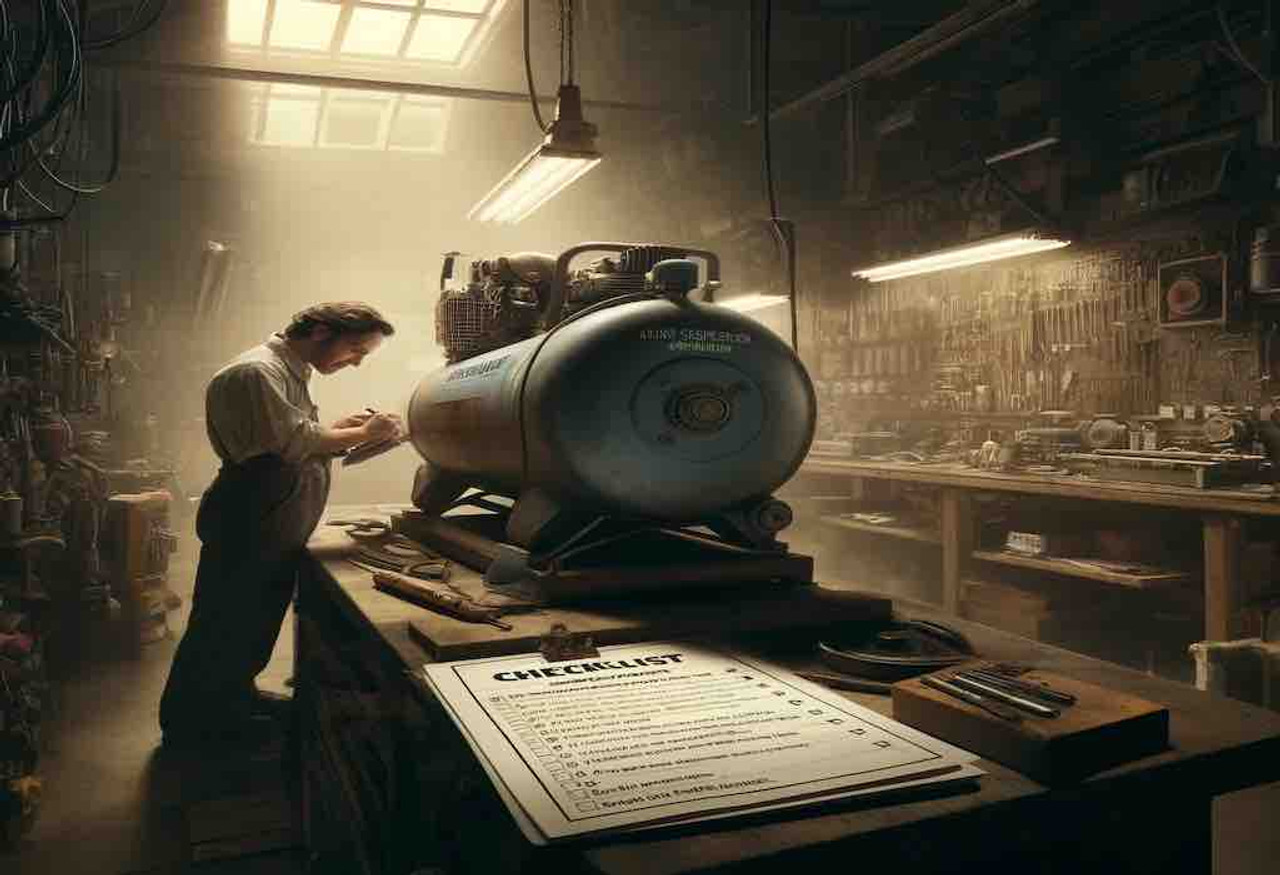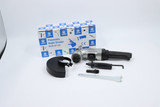Optimizing Air Compressor Longevity: Essential Maintenance Tips for Peak Performance
Maintaining your air compressor is akin to fine-tuning a high-performance engine: regular care ensures it runs at peak efficiency and extends its service life, ultimately translating into significant cost savings and minimizing operational downtimes. Whether you rely on your air compressor for industrial applications, automotive tasks, or various DIY projects, understanding the importance of routine maintenance is the first step toward securing its reliability and longevity.
Key Takeaway
The longevity and efficiency of your air compressor heavily depend on regular and correct maintenance practices. By incorporating routine checks, professional inspections, and timely parts replacement into your maintenance regimen, you ensure peak performance and prevent costly repairs or replacements in the future.
Understanding Your Air Compressor
Air compressors come in various designs, each with specific maintenance needs that are crucial for their optimal operation:
- Piston (Reciprocating) Compressors: These compressors are commonly used for a wide range of applications and require regular oil checks, changes, and cooling system maintenance.
- Rotary Screw Compressors: Known for their durability and efficiency in continuous-use environments, these models demand consistent monitoring of their oil, filters, and separators.
- Portable Compressors: While often less maintenance-intensive, portable units still need regular checks for leaks, proper oil levels, and clean air filters to prevent wear.
Understanding the manufacturer’s maintenance guidelines provided in the user manual is paramount. These guidelines offer specific instructions tailored to your compressor model, ensuring you perform the correct maintenance tasks at the right intervals.
Routine Air Compressor Maintenance Checklist
To keep your air compressor in top condition, incorporate these maintenance routines into your schedule:
Daily Checks:
- Inspect the unit for leaks, as air leaks can significantly reduce efficiency.
- Verify the oil level in oil-lubricated models; inadequate oil can lead to overheating and increased wear.
- Check the pressure settings to ensure they align with your operational requirements.
Weekly Tasks:
- Drain any moisture from the tanks. Moisture accumulation can lead to rust and reduce the compressed air quality.
- Inspect air filters for clogging or damage. Clean or replace as necessary to ensure clean air intake.
- Examine belts (if applicable) for signs of wear or looseness, which could affect performance.
Monthly Responsibilities:
- Clean air intake to prevent dust and debris from entering the compressor, which can degrade its performance.
- Check hoses for wear or damage. Brittle or cracked hoses can leak air and compromise the system's efficiency.
- Verify the operation of safety release valves. Properly functioning safety valves are crucial to prevent over-pressurization and potential compressor failure.
Let's pause here before diving into deeper maintenance tasks, professional inspections, and the importance of a clean compressor room environment.
Deep Cleaning and Professional Inspections
Ensuring your air compressor operates efficiently over the years requires more than regular maintenance; deep cleaning and professional inspections play crucial roles as well.
- Scheduling Professional Inspections: It's advisable to have your air compressor inspected by a professional at least once a year. These inspections can uncover potential issues that may not be evident to the untrained eye, such as internal wear or impending failures of electrical components. Early detection can prevent costly repairs and downtime.
- Deep Cleaning of Compressor Internals: Depending on your compressor's model and usage, deep cleaning of its internal components (such as the air intake valves and compression chamber) can significantly improve its efficiency. Refer to the manufacturer's guide for recommendations on frequency and methods, as improper cleaning can cause damage.
Changing Oil and Air Filters
For oil-lubricated compressors, changing the oil and filters is paramount to maintaining peak performance:
- Changing the Oil: Regularly changing the oil according to the schedule recommended by the manufacturer—or more frequently in dusty or dirty environments—helps ensure the compressor's internal parts are well-lubricated and operating smoothly. Use the type of oil specified by the manufacturer to avoid damage.
- Replacing Air Filters and Oil Filters: Clean air filters are essential for the compressor to operate efficiently and to prevent contaminants from entering the air supply and the compressor's internals. Similarly, changing the oil filter as recommended can prevent oil contamination, which could lead to wear and tear on internal components.
Maintaining the Compressor Room
The environment in which your air compressor operates can significantly impact its performance and longevity:
- Ensuring Adequate Ventilation: Proper ventilation in the compressor room helps prevent overheating and allows the compressor to maintain optimal operating temperatures. Overheating can lead to premature failure of various components.
- Optimal Environment: Keep the compressor room clean and free of dust and debris that could enter the compressor. Control the room's temperature to prevent excessive cold or heat, which could affect the compressor's efficiency.
Detecting and Fixing Leaks
- Techniques for Detecting Air Leaks: Regularly check connections, hoses, and fittings for leaks using soapy water or specialized leak detection equipment. Even small leaks can lead to significant energy losses and reduced compressor performance.
- Importance of Timely Repair: Promptly fixing detected leaks not only saves energy but also prevents the compressor from overworking, which can shorten its lifespan
Upgrading and Replacing Parts
As your air compressor ages, certain parts may require upgrading or replacement to maintain optimal performance and efficiency:
- Upgrading Components: Innovations in compressor technology mean that newer parts may offer better performance or efficiency. Upgrading components like the motor or pump can breathe new life into an older compressor.
- Replacing Worn Parts: Regular wear and tear can lead to the deterioration of components such as hoses, belts, and seals. Keeping a stock of essential spare parts and replacing worn components promptly can prevent unexpected downtime and extend the compressor's lifespan.
Record Keeping
Maintaining a detailed service log for your air compressor is invaluable for several reasons:
- Tracking Maintenance Activities: A log helps ensure regular maintenance tasks are noticed, contributing to the compressor's longevity.
- Troubleshooting: A comprehensive record can be a critical tool in diagnosing issues, allowing you to identify patterns or recurring problems.
- Warranty Compliance: Many manufacturers require proof of regular maintenance for warranty claims. Keeping detailed records can support your claim should a major repair be needed.
Conclusion
Regular maintenance is the cornerstone of ensuring your air compressor operates efficiently and lasts as long as possible. By understanding the specific needs of your compressor type, adhering to a routine maintenance schedule, and being proactive about repairs and upgrades, you can significantly enhance the performance and lifespan of this vital equipment. Remember, the maintenance cost is minimal compared to the expense of compressor failure and downtime.
Call to Action
For all your air compressor maintenance needs, from spare parts to professional advice, visit Tend Industrial Supplies at Tendsupplies.com. Our extensive selection of maintenance tools, parts, and accessories, combined with our expert support, ensures your air compressor remains in top condition. Let Tend Industrial Supplies help you maintain your investment and keep your operations running smoothly. Contact us today!
FAQs
How often should I change the oil in my air compressor?
- Typically, oil should be changed every 500-1000 hours of use, but check your manufacturer’s recommendation for the best guidance.
Can a dirty air filter affect my compressor’s performance?
- Yes, a clogged air filter restricts airflow, causing the compressor to work harder, which can reduce efficiency and increase wear.
What are the signs that my air compressor needs professional inspection?
- Unusual noises, decreased performance, excessive vibration, or any sign of overheating warrant a professional inspection.
Is it necessary to keep spare parts on hand?
- Keeping a stock of essential parts like filters, belts, and seals can help you quickly address issues without significant downtime.
Does ambient temperature affect my compressor’s performance?
- Extreme temperatures can affect compressor operation. High temperatures can lead to overheating, while very low temperatures can cause starting issues.









